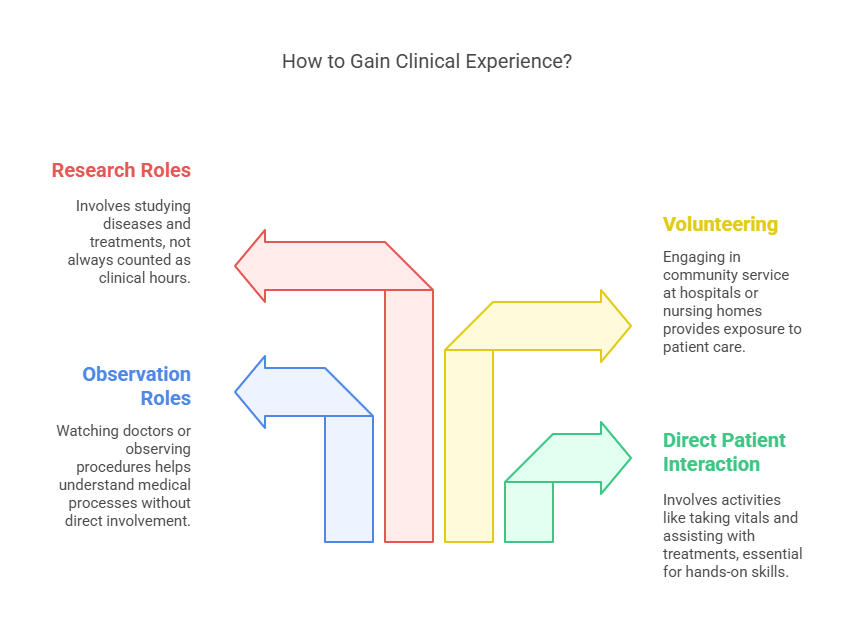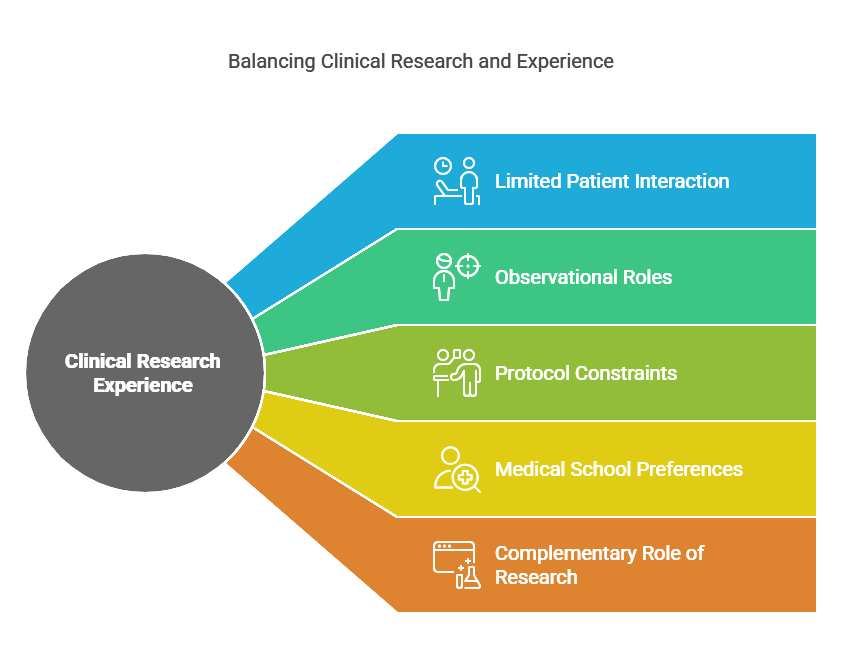Does Clinical Research Count As Clinical Experience?
Does clinical research count as clinical experience?
Have you ever wondered what is considered clinical hours for medical school applications? This is a question of many aims for those who are aiming to become a medical professional and require to gain useful experience before even applying. One of the most common forms of confusion is whether clinical research can be considered clinical experience. Although both clinical research and clinical experience imply engaging in healthcare organizations’ operations, they are different in a crucial way that may affect how medical schools perceive each. These differences may be important for students to know in order to navigate their way to medical school.
Clinical research as defined by the dictionary includes studies performed to gather information on a medical condition, treatment or its outcome. It entails data collection, results analysis, and analysis of different aspects of the healthcare system. Nevertheless, when it comes to medical school applications, the question is still unanswered: Does clinical research count as clinical experience? It has to be admitted that clinical research is a valuable contribution and leads to the advancement of medicine, but it is not always equivalent to clinical experience. Medical schools not only focus on academic performance but also on practical experience that a student has while interacting with patients in a healthcare setting.
It is important for those applying to medical schools to understand what clinical research is, and how it differs from clinical experience. However, such research does not necessarily involve patient care and contributes to the development of the necessary knowledge and skills. On the other hand, clinical experience is usually understood as the actual number of hours spent in direct contact with patients and rendering them aid. Both kinds of experience must be part of the applications of applicants to medical schools and for the preparation for the future challenges of a medical career.
What Counts As Clinical Experience?
Clinical experience is direct patient relations in a healthcare setting. It includes those activities that find students, in the process of becoming medical professionals, actually involved in patient care such as supporting doctors, nurses or other healthcare providers. This kind of experience assists people to gain essential medical skills and also a better understanding of patient care. Many medical schools have a requirement of certain number of hours which has resulted in the question; what counts as clinical hours? Most clinical experiences involve direct patient interaction such as taking vitals, assisting with treatments or even observing medical procedures.
There are many ways to get clinical experience. Common ways include: watching doctors, being a medical scribe, helping in nursing homes, or volunteering in hospitals. Hours can be counted toward required hours by roles like EMTs and medical assistants, who actually interact with patients. Although clinical research is definitely important in medicine – for instance, by helping to learn about diseases and treatments – it is not always considered direct clinical experience. This can assist students in understanding how to balance both types of experience into a stronger medical school application if they know what is clinical research and the clinical research definition.
Comparisons Between Clinical Experience And Clinical Research
A clinical experience and a clinical research are both important in the medical field but they are not the same. Clinical experience is direct patient care while clinical research is the study of diseases, treatments, and medical advancements. Both are equally important for medical students and professionals but they are different. Some have asked what is considered clinical hours and if research can be considered clinical experience. To understand what is clinical research and what is its place in medicine, it is necessary to define the concept and discuss the main characteristics of the concept. See the table below for the main differences between the two.
| Factor | Clinical Experience | Clinical Research |
|---|---|---|
| Focus | Direct patient care using approved treatments | Data collection to study new treatments or medical approaches |
| Patient Selection | Patients receive care based on medical needs | Participants are chosen based on specific research criteria |
| Treatment Approach | Uses well-established medical procedures | May involve experimental treatments or new drugs |
| Documentation | Routine medical records for patient care | Detailed study records for accuracy and research integrity |
| Ethical Considerations | Follows standard medical ethics | Requires extra ethical review due to potential risks |
| Overlap | Involves patient interaction, treatment monitoring | Researchers may interact with participants and track outcomes |
| Example | A nurse assisting a patient during recovery | A study testing a new medication’s effectiveness |
Medical School Perspectives On Clinical Experience
This helps them to use class knowledge of patient treatment in real life and develops their skills in diagnosis, treatment and communication. They do that most schools demand a certain number of clinical hours, and students have to ask what does count as clinical hours. The hours can be obtained by cinematography, aid procedures, or working directly with patients. Some students in your group are not sure if clinical research can be considered as clinical practice. Common input selections say that although research is good for critical reasoning and knowledge gain, patient care is more critical. However, the combination of clinical experience and research output will enhance an application if the applicant has a good understanding of therapy.
The experts at medical school entrances have said that clinical research is useful but not as useful as patient care done by the hands. What is clinical research? This includes finding out about diseases, treatments, and patients with the aim of enhancing the patient’s care. The clinical research definition entails data collection from patients, conducting experiments, and analyzing the results. Although it is not the same as clinical experience, some medical schools consider it as an associate when combined with direct patient contact. Counsellors advise that both should be done to gain a better understanding of therapy and increase the chances of getting accepted.
Benefits Of Gaining Clinical Experience Through Clinical Research
Clinical research provides a unique opportunity to have hands-on experience in the medical field. This allows students and professionals to work with patients, collect and analyze data, and contribute to new medical findings. This experience helps to create essential skills and prepare individuals for medical challenges in the real world. Below you will see the benefits of gaining clinical experience through clinical research.
Skills Development: Clinical research improves important skills for thinking, problem-solving, and data analysis. It also improves patient communication by teaching researchers how to explain the study processes and conclusions clearly.
Exposure To New Means: Working with research tests allows individuals to learn about the latest medical funds and technologies before they become widely available.
Research Design Understanding: Participation in studies helps individuals know how research is structured, including patient choices, data collection, and moral ideas.
Real-World Application: Clinical research experience translates directly into medical practice, such as using study data to improve patient care and treatment decisions.
Ethical Awareness: Research emphasizes the importance of patient safety, informed consent, and moral decision-making in medical environments.
Career Growth: Getting clinical research experience can increase job prospects, especially for those interested in special areas, research, or academics.
Access To Medical Experts: Working with experienced doctors and researchers provides mentorship and networking opportunities, which can be valuable for career development.
Possible Limitations Of Clinical Research As Experience
Clinical research provides valuable insights into medical advancements, but it has certain limitations when considered as clinical experience. One of the main troubles is the limited patient relations in many research roles. While some studies involve direct work with participants, others focus mainly on data collection, record analysis, or lab work, offering little to no hands-on involvement with patients. This can be a drawback for students looking to gain practical clinical experience, as many medical schools prioritize direct patient care. Admissions committees often view clinical research as beneficial but not a complete replacement for shadowing, volunteering, or clerkships. While research can strengthen an application, students are encouraged to balance it with traditional clinical experiences to meet the expectations of medical programs.
Research roles often focus more on data collection than direct patient care.
Some positions may only involve observing rather than performing medical tasks.
Clinical research protocols may limit hands-on involvement in treatment.
Medical schools generally prefer applicants with direct patient interaction.
Research experience is considered an addition rather than a replacement for clinical experience.
A balanced approach, including both research and patient care, strengthens a medical school application.
How To Maximize Your Clinical Research Experience?
In order to use the maximum benefit of clinical research experience, students should look for roles that allow direct patient interaction. Some research positions focus only on data analysis, but others include tasks such as helping with the patient's consent, helping with medical evaluation, or interpreting study processes. Choosing the roles that involve these responsibilities helps to create communication skills and helps with exposure to a real healthcare environment. Students can also take the initiative by asking for more patient-focused tasks or by observing clinical procedures whenever possible. Knowledge of the patient's care, medical decisions, and how to develop treatment can be expanded by linking to doctors and research teams.
Since medical schools have given tremendous significance to clinical experience, students should balance research work with other patient-focused activities. Doctors help doctors develop essential skills such as the bed by the bed and direct patient care. The combination of research with these experiences creates a strong application that shows an understanding of both medical research and practical patient care. Admission committees appreciate students who can bridge research and health services in the world, and perform a good approach to therapy.
Conclusion
Understanding the difference between clinical research and clinical experience is essential for medical school applicants. While research enhances medical knowledge, it may not always involve direct patient care. Schools prefer hands-on patient interaction, but research can strengthen an application when combined with clinical experience. Choosing research roles with patient involvement can be beneficial. Balancing both areas helps students build a strong foundation for a medical career.
Interested in clinical research? CCRPS offers flexible, industry-recognized courses to help professionals advance their careers. Explore our programs and take the next step toward success.
Explore Courses for Clinical Research Career
Courses Available:




